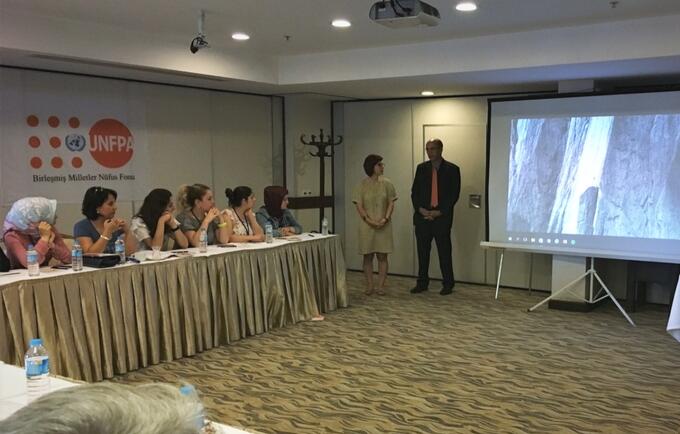ANKARA – The first Youth Friendly Health Service Provision Training was organized by Youth Approaches in Health Association (Y-PEER Turkey) and United Nations Population Fund (UNFPA) with the support of Japanese Government on August 1st, 2017 in Ankara. Service providers at UNFPA Women and Girls Safe Spaces (WGSS) are trained on youth friendly health services.
Youth-friendly service delivery is about providing health services based on a comprehensive understanding of what young refugees in any given society or community seek for and need. It is also based on an understanding of, and respect for, the realities of young people’s diversity and sexual rights.
Assistant Professor Özge Karadağ Çaman from Hacettepe University described the aim of the training as “This training aims to build a capacity for health service providers who are part of humanitarian aid progremmes and need to develop new professional skills to have unique attitudes and approaches when dealing with young refugees who seek health service providers' assistance.” Dr. Çaman also listed the targets of this training as “In the conditions of humanitarian crises, to identify the obstacles that these young refugees face when attempt to access health services and to devise methods to eliminate those obstacles; to identify activates which can help the service providers reach out these young people; to develop a monitor and feedback system to follow up young refugees’ progress”
In his opening remarks, UNFPA Turkey Representative Karl Kulessa said “Welcome to Ankara. The very important reason you are all here is to do with assisting young refugees who have been overlooked so far. We aim to focus on them and try to address their needs. We observe that when developing plans to assist refugees, young people are usually neglected. Thanks to UNICEF, a lot of children can be included into the education system. However, a bit older young people find themselves out of the system. As UNFPA, we think this young group should be taken into consideration and be provided services that they desperately seek. We need people like you, service providers, to reach out to them which is the most important task you need to execute. Reaching the young refugee population should not only be limited to sexual and reproductive health services yet we should also consider how we can engage with them and let them be part of the society and motivate them to engage with us. While we concentrate on this issue, we should not solely work with young girls; we also need to work with young boys who may or may not work or study as a result sit around with plenty of time in their hands. Because of the reasons I mentioned, this workshop has vital importance for laying the foundation for being able to provide health services to young people.”
With the support of the Japanese Government, United Nations Population Fund (UNFPA) and Youth Approaches in Health Association (Y-PEER Turkey) organized these training sessions. The second training of the series will be done in August and the third one is planned to be done in October.


